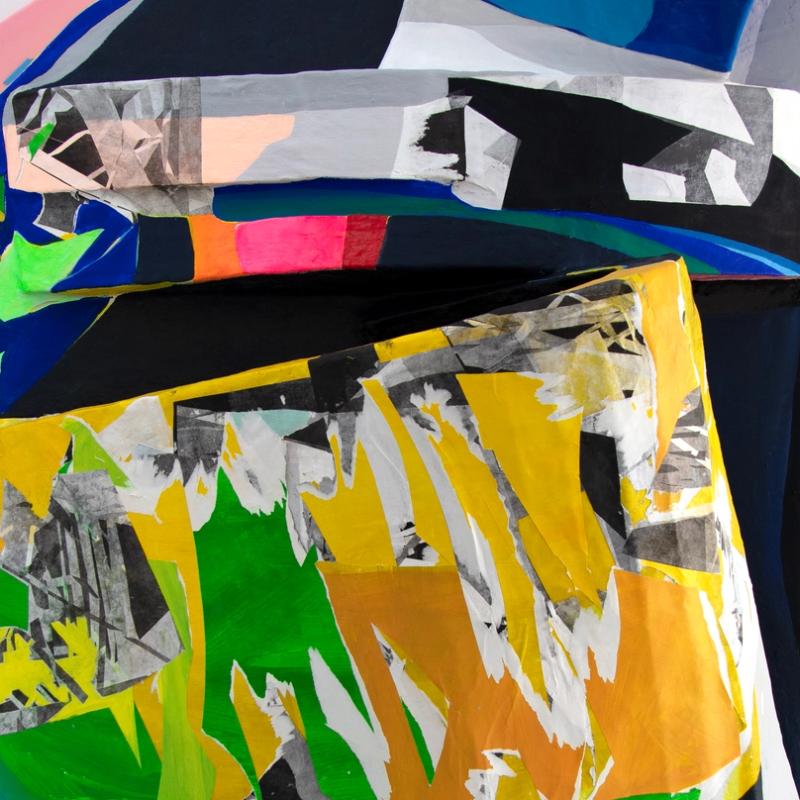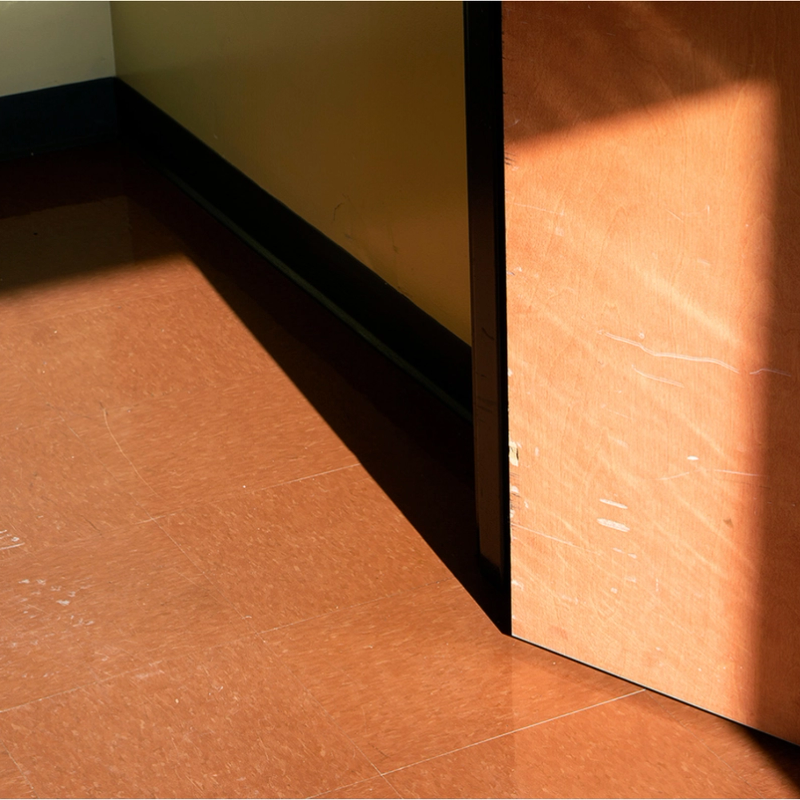Libertad
by Bessie Flores ZaldívarChapter 1
Mami honks for the third time, and that’s how I know it’s not going to be a good day. Her hand stays pressed to the steering wheel’s heart for several seconds, making the inside of the car and my ears vibrate.
“Puta, every single morning with you three. Where is your brother? I’m going to be late again.”
She’s doing her eyeliner on the rearview mirror. I can see the frame of her dark eyes and full eyebrows from the back seat. It takes her less than a few seconds to draw the line below the inside of her eye to the outside, all in one swift motion—no halts, no second-guesses. She holds my eyes for a second through the reflection and honks again.
“Puta, puta, puta. I’m leaving him. Every morning the same fight.”
I want to point out there’s only one person missing, so, technically, it’s not “us three”. Alberto and I have been sitting in the car for the past fifteen minutes. But silence is the move with our mom at six a.m. Also, I’m all for Mom leaving Maynor. He’s made us late every single day for the last two weeks.
“I’m gonna get fired. Is that what you all want? If it was one of his stupid soccer games he would be the first one in the car. Pero como mi trabajo a nadie le importa. Libertad, go look for your brother. Incredible, a grown-ass man who can’t get ready on time.”
I sigh getting out of the car but I’m careful not to slam the door. If Mom thinks que estamos siendo malcriados, her anger hottens like a seatbelt buckle inside a parked car in the summer. I walk up the stairs past Abuela’s room to Maynor’s, hoping he’s, at least, dressed. My hopes are half-met. He’s sitting at the edge of his unmade bed, shirtless. His black hair is wet and some drops run down his neck and face, tiny reflectionless mirrors all over his skin. The room doesn’t smell like shampoo or deodorant—none of those ready-for-the-day smells—instead it’s like dirty laundry and sunlessness merged. He’s not even on his phone or putting on shoes, just staring at his hands.
“Maynor, the fuck? You want Mom to kill us all?”
For a second, it’s like he didn’t hear me. Like he’s watching a movie play on the palm of his hands. But then he looks up and smiles.
“Tranquila, Libi. You know how she gets. I’m coming.”
His voice is drowned out by another ten-second honk. I swear the whole block hates us. He looks for a shirt in the pile of clothes on his bed. I’m taken aback by how skinny he looks. I don’t think I have really looked at him recently. The bones in his back are easily delineable. His jeans would fall to his knees if it wasn’t for the belt. A few bruises spread over his lower back and left arm, right by his bumpy half-moon elbow mole—shapeless purple spots ringed with yellow and green. Not an uncommon Maynor thing, or any good goalie really. He has played ever since I can remember. Growing up, I believed him when he said he would go pro. Probably everyone did. He still loves it more than anything. Definitely more than la medicina, which is what Grandma and Mom are making him do instead.
He finally picks a shirt and begins to put it on. Of course it’s a soccer jersey. Today’s is actually my favorite—a vintage Olimpia, the current champion of the national soccer league. Red and blue stripes with a white lion’s head embroidered on the heart. I remember Maynor begging Mami to buy it for him seven years ago.
“Apuraté,” I say. “No time for you to comb your hair, just wear a hat or something.”
He climbs in the back seat next to Alberto, leaving me with no option but the passenger. Mom hates it when we all sit in the back, says it makes her look like our driver or something. Maynor usually calls shotgun, says it’s his birthright because he is the oldest. Lately, though, he does everything in his power to stay away from Mom. She starts speeding before I can close the door.
“How is it that your ten-year-old brother and seventeen-year-old sister can wake up early and be ready on time, but you, a twenty-five-year-old man, can’t?”
Maynor stays quiet, which is what I would do too. Daddy Yankee’s new song plays on the radio and just as Alberto begins to sing along Mom turns the volume down sharply.
“I’m asking you a question, Maynor José. What are you gonna do when you have your own patients, huh? Show up late to your appointments? What if there is an emergency? Let them die?”
“I’m––no, of course not, Mami. I just overslept. I had to stay up until three, reading like five hundred pages for my Radiology class,” he says.
This settles Mom for a minute. He’s good at that, using the career he is being forced to get as an excuse. Of course, Mami mustn’t have heard him coming in at two a.m.
“Bueno, hijo. This can’t keep happening. If you’re late tomorrow, I’m leaving you. None of you care about my job. I have to be there to pick all of you up on time every day but you can’t do the same for me. Fifteen years. That’s how long I’ve been taking you to soccer practices, Maynor. Not once have you been late. Not once. You wouldn’t do this to Abuela, would you? Malagradecido.”
Again, it’s not all of us. But when Maynor screws up, we all go down. I catch his eye through the sun visor’s mirror I’m using to put on mascara. He rolls his eyes and winks at me. I shake my head.
I need to remind Mom to pick up my phone at Texicell, the place where they will keep bringing your phone back to life even though it’s clearly time to get a new one. My phone, otherwise known as the biggest piece of crap in the world, otherwise known as my baby, has been in and out of Texicell ever since I got it. It was Maynor’s first, and even though its visit to the doctor is sort of my fault this time, Maynor made sure to make it nearly unusable before passing it on. I know Mom won’t buy me a new one until the self-taught technicians from Texicell declare it irreparably dead. Reminding Mom right after her rant about us being ungrateful is tricky. But usually our hour-long drive through the city allows for as many changes in mood as songs. Mom turns up the volume again and switches stations. I know she can’t stand reggaeton this early.
The streets are full like every day, regardless of the time. Cars honk, and when that’s not enough, people yell at each other. Cabron, no sabes manejar, pendejo. Newspaper sellers go from car to car pressing the front page to the driver’s window. Today’s headlines, in big bolded black and red letters, are about this weekend’s protests and the murder of three protestors by the military police. Peddlers knock on the front glass, trying to sell everything from mosquito zapper rackets to small plastic bags with thin slices of mango verde watered in vinegar and lime juice. They hope Mami will roll down her window a few inches and slide them a bill of twenty Lempiras.
A few men try to wipe the car’s windshield, pero Mami honks and shakes her finger at them. They’re reluctant to step away. For a second they just stare in before moving on, as if they can will her to change her mind. She pushes down the lock-all-doors button constantly, as if double-triple locking is an extra day of breath she’s blowing into our lungs. Traffic lights are tricky—we’re most likely to get mugged if the car is stopped and with the windows down. Mom was held at gunpoint for her purse and phone near here a couple months ago. So we keep the windows up, which sucks, cause even in the morning, the coolest time of the day, the streets of Tegus are warm and sweaty. The car’s AC hasn’t worked in years.
The voices of the hosts from Despierta Tegus fill the car. The radio show has been on for four years now. We listen to it every morning. I don’t understand how they haven’t run out of what to say. Today’s topic is movie titles with terrible Spanish translations that are nothing like the original. One of them says Jaws, which was called Tiburon in Spanish—Shark. The one with the very-low raspy voice brings up Pulp Fiction, called Violent Times in the translation. Javier, my favorite of the three, points out Brokeback Mountain, which in Spanish is Secreto en la Montaña. Secret in the Mountain.
“They definitely should’ve kept that movie a secret buried in some mountain,” Mom says, cutting someone off. They honk and yell something at her, but I can’t make it out.
“What secret?” Alberto says.
Maynor locks eyes with me again. I close the sun visor.
“Nada, Beto. Forget it,” she says.
“Why?”
“Hay no Mama, you shouldn’t say things like that. Aren’t all of your wedding designer friends—you know?” Maynor says.
“Bueno, si, pero eso doesn’t mean that I think it’s—”
“It’s just so ignorant,” Maynor says.
“Ignorant? Mira Maynor, I don’t know everything in the world but I’ve been alive longer than—”
“Mami,” I say, “I know you’re super busy today but is there any way you can pick up my phone from Texicell? I called yesterday and they said it’s ready. Please?”
“Pucha. I don’t know. Can’t you ask Abuela?”
“You know she can’t. She came home at ten last night, she’s with the costumes for some school play or the parade.”
“I have things too, you know? I have two menu tests for this weekend’s wedding. But even my mom thinks her work is more important than my job. I have to make time for everyone else’s—”
“Mami. Porfa. It’s been two weeks. I really need it. I had stuff for a school project on it.” Partially true. Not a school project, but a project nonetheless.
“Yes, yes. I’ll pick it up. I’ll go during my lunch break.”
We drop Maynor off at la UNAH, the National Autonomous University of Honduras. The campus is huge. Hundreds of people walk in all directions with purses and backpacks half-hanging from their shoulders. Some are dressed up in suits and formal skirts with dress shirts. Others wear T-shirts and ripped jeans or soccer jerseys. The wall next to us is covered in graffiti—a bunch of blue spray-painted [small caps] FUERA JOH [small caps] and [small caps] CHEPOS ASESINOS[small caps], a call for the president to step down and [small caps] killer cops [small caps].
Maynor mumbles something that sounds like “see you later” and slams the door. I half expect Mom to get out right then and yell at him in front of everyone, but she really is late today. She lets out a mico malcriado and speeds away.
Mami is the wedding planner at a local hotel. It’s not her dream job or anything. Though her official hours are from nine to five, she usually makes it home at around nine at night, except on weekends, when she’s there past midnight. Another underpaid job in this jobless city of labor. Her salary is crap. But she makes it work with Abuela, who has run a small sewing workshop for the past thirty years. Mostly school play costumes and ballet show outfits and quick patchwork.
“Here,” she says as we pull up to school. She hands Alberto and me seventy Lempiras each. “I didn’t have time to make you anything for lunch, Alberto. But I’ll ask Miss Lezama if you spend it all on Chilly Willys and candy. Get a pizza or a baleada, at least.”
“Ay, Mami,” Alberto says, rolling his eyes.
“Libertad, make sure he makes it to the classroom. I love you both. I’ll see you tonight.”
“Bye Mami, te amamos, don’t forget my phone,” I say.
“Te amo, Mami,” Alberto says.
“Yes, at least two of my children love me. Tell your brother when you see him I’m not doing this with him tomorrow. I just don’t understand this—this person he’s turned into. Always late, malcriado, all sensitive calling me ignorant over a movie.”


